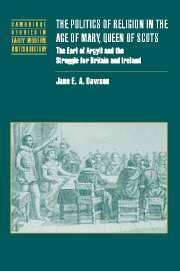 The Politics of Religion in the Age of Mary, Queen of Scots
The Politics of Religion in the Age of Mary, Queen of Scots Published online by Cambridge University Press: 20 July 2009
In an age of personal monarchy and small, tightly-knit élites, personal rule lay at the heart of political power in the early modern period. The story of personalities and powers revealing the interplay of men and events forms the central narrative of its political history and comes closest to the way in which contemporaries analysed their own world. The structures of government were important, but at each level of the political process it was the personal and kin networks that ensured they worked. This was particularly true of Scotland, where governmental institutions were less well developed than in other European states. Political biographies are essential in the study of sixteenth-century British history. Before 1603, there were no common political institutions covering all three kingdoms. In that sense, British politics had not yet arrived, though a handful of British policies and British politicians flourished. The political history of the Atlantic archipelago during the sixteenth century has to be written around these personalities and their actions.
The use of political biography also offers an escape from two concepts that have dominated modern historical writing and have bedevilled the writing of British history. The first is state-centred history, which assumes that politics and international relations can be explained exclusively in terms of the state and its institutions. Although the interaction between centre and localities has long been recognised, many of the underlying assumptions about the institutional nature of early modern politics remain.
To save this book to your Kindle, first ensure [email protected] is added to your Approved Personal Document E-mail List under your Personal Document Settings on the Manage Your Content and Devices page of your Amazon account. Then enter the ‘name’ part of your Kindle email address below. Find out more about saving to your Kindle.
Note you can select to save to either the @free.kindle.com or @kindle.com variations. ‘@free.kindle.com’ emails are free but can only be saved to your device when it is connected to wi-fi. ‘@kindle.com’ emails can be delivered even when you are not connected to wi-fi, but note that service fees apply.
Find out more about the Kindle Personal Document Service.
To save content items to your account, please confirm that you agree to abide by our usage policies. If this is the first time you use this feature, you will be asked to authorise Cambridge Core to connect with your account. Find out more about saving content to Dropbox.
To save content items to your account, please confirm that you agree to abide by our usage policies. If this is the first time you use this feature, you will be asked to authorise Cambridge Core to connect with your account. Find out more about saving content to Google Drive.